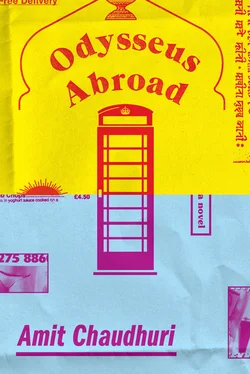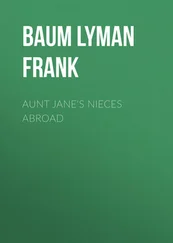“Pupu he ,” said Rangamama. “I’m ready when you are!” Ever the gent. Apparently he’d been miserable when he’d arrived in 1957, tearful, and wanted to run back to Shillong. “Can I have the rabbit?” he’d said to the man taking orders in a tea shop. The man had contemptuously cast a plate of thinly sliced cheese toast before him and said, “ There’s your rabbit!” Rare-bit. Ray-bit. He was over all that now, not quite integrated but perhaps as assimilated as he could be in any milieu. Actually, he was much happier than Ananda had seen him even two years ago. The early retirement had freed him utterly. He poked at the knot of his tie and considered the face in the shaving mirror — eyes narrowed, cheeks sucked in. He had the thinnest moustache above his upper lip, which he must have cultivated as an addition when he was a youthful dandy; lips that veered towards the thin, but were a bit fuller than Ananda’s mother’s; a prominent nose. He didn’t have fat cheeks, but some nervous anorexic impulse made him suck them in when he regarded himself, since his ideal, when it came to the ur-male, was Humphrey Bogart: urbane, dissipated. Each time he turned to the mirror he made a face like Bogart did when Lauren Bacall had just lied to him, or when he’d heard a funny sound: on high alert; undeceived.
Tearing himself away from his image, he said, “I had ten glasses of water this morning. Flushes the system. You should try it.” A challenge. Ananda nodded vaguely.
Glancing at the broadsheet folded on the table, he wrinkled his nose: “I never read the ‘intellectual’ papers— Times; Guardian . I prefer the Sun .” A put-down — aimed vaguely, but unmistakable. The inference was: he was too good for the Times . Either dirt or the heavens for him: nothing in between. Ordinary mortals, belabouring their thoughts and emotions (the word “intellectual” was a euphemism) read the Guardian —solitary, stratospheric wayfarers who made their own road couldn’t be bothered.
Ignoring him, and still seated though his uncle was ready to go, Ananda said, as if reminding a schoolboy of his botched-up homework: “What’s that in the kitchen? You’ve been cooking?”
“Liver,” said his uncle, happy to share his recipes: “Cooked with butter and onions and chilli powder — and in its own blood.”
Ananda made a face.
“That sounds…” He didn’t need a word.
“I never wash the blood away. Arrey baba, that’s where the strength lies.” Nothing he did was merely sloppy, though his home, his bed, his knick-knacks might make you think otherwise; everything was a product of painful strategy. One of his ambitions was to have a healthy and worryingly long life. (“I’m going to be a hundred — at least,” he’d said to Ananda, making the young man anxious at the prospect of his uncle being around for another forty years: for some reason, though he’d deny this, he took his uncle’s remarks with immense seriousness.) The ambition seemed curiously at odds with his other one — of never to be born again — though there was no actual link between the two. You might want to live inordinately long; you might also wish to never experience life again. (“I couldn’t stand it a second time,” he’d confessed to Ananda with an intake of breath. The word abar —“again”—was full of terror. “A horrifying thought.”)
The injunction about cooking liver fell on deaf ears. Ananda stayed with his uncle’s statements a few moments at a time; engaging with them led to long-drawn-out quarrels.
“Give me a minute,” Ananda said, getting up. “I’d better go to the loo too.”
“For big job or small?”
Ananda didn’t give him the satisfaction of an instant reply.
“Small.” He closed the door to the bedsit behind him.
He was more like his uncle than he cared to know. Naranang matulakrama , his mother had said mysteriously when he was quite young: “Man’s made in his maternal uncle’s mould.” Ananda’s father too had pointed out resemblances, mildly surprised, as when a memory not only returns to you but is reincarnated uncannily. There were few likenesses between uncle and nephew except the slight slouch while walking; Ananda looked more like his father. But part of the DNA had been reproduced invisibly. Elements of the repetition made Ananda’s parents smile conspiratorially, given the gifts Radhesh had had; but also fret, since he’d taken his peculiarities too far. The intensity of those peculiarities had hopefully been diluted in their son. Still, he had to pee before he went out — it was like the physical equivalent of a confession before dying: meant to make the journey lighter. In the hallway, entering the loo, he saw the door to Shah’s room ajar. A pigsty. Made his uncle’s room look tidy.
A cigarette butt! In the pool inside the commode. He knew his uncle had thrown it there. Rangamama had cut down on his smoking, but he must have one on the toilet seat. A habit acquired in Sylhet, where the bathroom — according to him — was a purgatory, the cigarette the only means at hand of negating it. Ananda flushed, a god unleashing the elements; there was a storm within, culminating in a vortex. What’s this? The damn thing had survived! There it was, motionless, barely mindful of the deluge that had just covered it. As the cistern filled, he aimed his stream of urine at it and simultaneously flushed again, so that it was assaulted on both sides. The world slowly returned to what it was. What! Still there, ever-resurfacing, plucky, bothersome! He zipped his trousers. Let his uncle and Shah and the other neighbour (whoever he was; there was a third tenant in the basement) deal with it.
—
Voices. He opened the door and found Shah, tall, wearing his tweedy green jacket, addressing his uncle.
“Why you are not taking him back?” he asked the moment he saw Ananda. “Take him to India. I told your mother the same thing!”
Shah was not his real name — it was Abbas. A Pakistani who owned a shady pharmacy in Kilburn (his uncle wasn’t sure if it existed), and boasted he knew Margaret Thatcher, Michael Heseltine, and various leading lights of the Tory party. “You want to meet Vice Chancellor?” he’d said when Ananda had murmured something about his college. “I will arrange it.” Not “can,” but “will”; as good as a threat. He was not only his uncle’s neighbour, he was his principal “contact”—his uncle’s chief access to the British State. If, notionally, his uncle got into trouble with the government, Abbas would “take care” of the problem. Till then, Abbas’s mettle as a fixer in the higher echelons didn’t need testing. Ananda had warned his uncle that it was Abbas who might get in trouble with the government soon, and his uncle might be summoned. “Be careful,” he said. “Shah” was the name that his uncle had conferred on Abbas as he was a dead ringer for the Shah of Iran. They referred to him in private as only “Shah”—not even “the Shah.” Abbas had no idea. Take away the warm, clanging Punjabi accent and put him in a white jacket with epaulettes and a cross-section of medals, and he could pass for the disgraced monarch. Or put the Shah in a tweedy jacket and you’d have Abbas. His uncle and he had been neighbours for fifteen years. On Ananda’s first evening in London in 1973, when he and his parents had walked from the bed and breakfast under sodium vapour lights to an Indian restaurant on Haverstock Hill, his uncle had informed them, as they sat at a table in front of a huge picture of the Taj Mahal, “Shah will be joining us, he lives in 24 Belsize Park,” adding by way of explanation, “he looks exactly like the Shah of Persia.” In fact, he could have been the Shah (he’d joined them shortly, sidling his way into their company, his massive aquiline nose hovering in Ananda’s line of vision all evening) in hiding in London, incognito in a first-floor bedsit in Belsize Park, except the Shah wasn’t then in exile, but lording it over Iran with the help of SAVAK. And he might be the Shah now, except he couldn’t be — the Shah had died a homeless and kingdomless man in Egypt five years ago. So this person had to be Abbas, living in what Ananda had noticed was a pigsty.
Читать дальше











